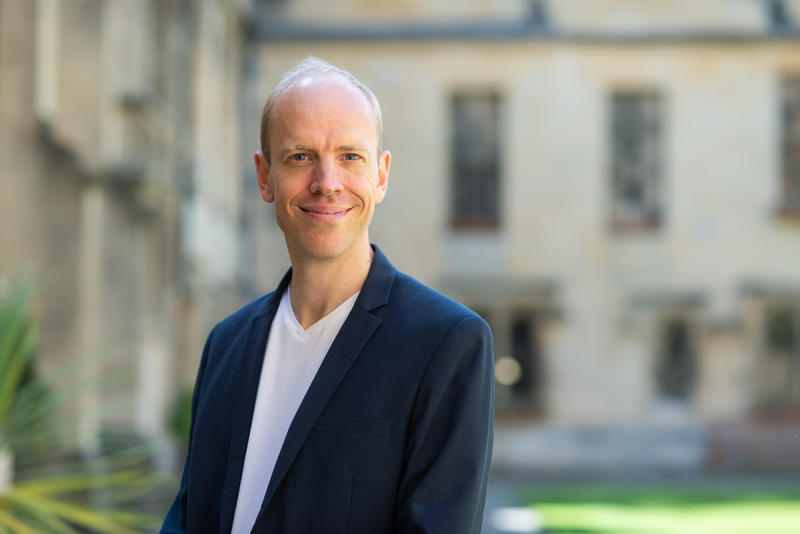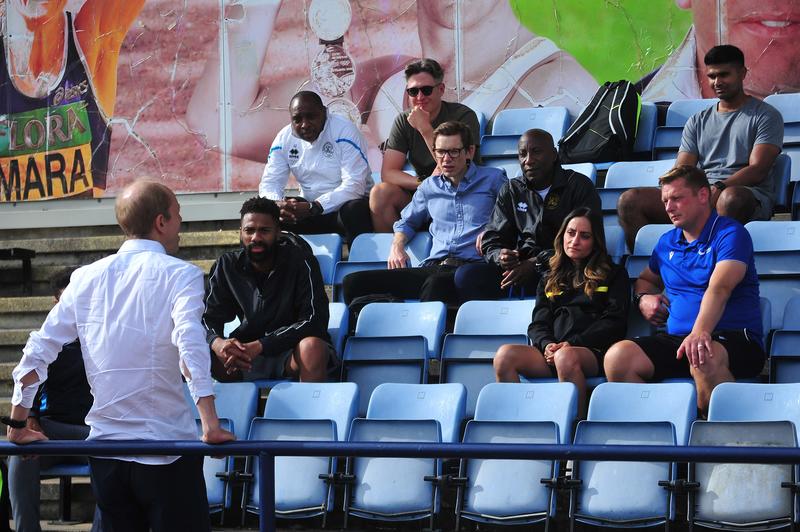SHAPING A BRILLIANT ROLE

SHAPING A BRILLIANT ROLE
Alex Betts discusses his vision as the University's first Local and Global Engagement Officer
Published: 25 October 2023
Author: Richard Lofthouse
Share this article
Professor Alex Betts began his new role in late May, so by the time QUAD caught up with him in mid-September he was already fizzing with visions and actions.
But first, and to recap, where did the role come from? In Professor Irene Tracey’s admission speech as Oxford’s new Vice-Chancellor in January 2023, she highlighted the need to better coordinate, strengthen and deepen the relationships between the city, county and the University. Betts’ role was created to spearhead that effort, and he was duly appointed.
He is Professor of Forced Migration and International Affairs and William Golding Senior Fellow in Politics at Brasenose College. Prior to his current role he was Associate Head of the Social Science Division at the University, and Director of its Refugee Studies Centre.
If his previous roles were challenging, I venture, the new one sounds vast.
‘Some of my colleagues jokingly asked, does the role also include the inter-planetary and metaversal?’
As for overcoming the Town and Gown divide, which might be a simple way of cutting to the core, surely this is a challenge as old as the University itself?
He acknowledges that this is just one turning moment in the vastness of Oxford’s history, but suggests there is real moment of opportunity now to do things differently.
‘At times, we could have done more to be a better neighbour,’ he adds.
It is well known that Professor Tracey was born and bred in Kidlington. She attended Gosford Hill School, a comprehensive school. She has publicly declared that under her watch the University is going to do better by the community in which it sits, without of course giving up on the global position it holds, ranked Number 1 in the 2023 Times Higher Education Rankings.
Betts says, ‘I want to champion the many good things that are already happening across the Collegiate University, connect people internally and externally, and convene new initiatives that can have positive impact across Oxfordshire.’
He has spent much of the Summer getting to know local community organisations, City and County Councillors, and business leaders, designing a strategy for the new role. On October 12 he took part in the CEO Sleepout in Oxford, alongside other senior officers of the University including the Vice-Chancellor.
Playing devil’s advocate, I ask why it is the University’s job to fix a societal problem.
‘It’s about both our values and our interests – our staff and students want to be part of an organisation that does good in the world, and the University and the region are hugely interdependent. We cannot succeed unless the local community thrives, and vice versa.’
Betts also highlights his belief that universities have a responsibility to respond to inequalities on their doorstep, recalling his experience at Stanford University where he was previously a post-doc.
‘At the time, East Palo Alto was a no-go area, a ghetto if you like, in close proximity to this glitteringly successful university. That is not conducive to success, and it is a bad look.’
Bringing it back to Oxford, Betts says that community perceptions of the University they often involve phrases like ‘academic Disneyland’, as though the combination of Hogwarts, tourism and lofty old buildings have sometimes combined to make it all seem remote, perhaps even make-believe.
Students are viewed as transient – which of course they are. Some never venture east of Magdalen Bridge and rarely interact with communities beyond the historic city centre.
Perception is one thing. Worse are the hard statistics that point to what Betts refers to as ‘extraordinary gaps in life expectancy, educational attainment, and health outcomes across different Oxford communities.’
For instance, he points out, between Jericho, on one hand, and the Northfield Brook Estate in Blackbird Leys, on the other, there is a fifteen-year difference in life expectancy among men, which is a shattering disparity to acknowledge.
The finding was published in 2018 in an Oxfordshire Community Foundation report. The same report, Oxfordshire Uncovered report found that there are 15 neighbourhoods in Oxfordshire ranked among the 20% most deprived nationally.
Betts says he has been gradually building connections in Blackbird Leys.

One of the big actions that he is championing is the University sharing its sports facilities with the community. Thirty pupils from Year 8 (ages 12-13) from Greyfriars School will spend a day a week this term at the University – mornings receiving sports coaching at Iffley Road, lunch at a college, and afternoons learning from professors about law, neuroscience, and business, and how they relate to sport.
Isn’t this a bit ‘down with the kids’ I ask, given that Oxford isn’t world famous for sport as much as academic research and world-beating COVID vaccines?
‘When we’ve asked, access to sports facilities is one of the things community organisations consistently prioritise. And sport is a terrific way to build bridges across communities, and inspire young people to be interested in university. We want local children to feel that the University is an exciting and inspiring place that is open to them.’
His hope is to expand the programme to other secondary schools in the city, acknowledging that resource is finite but suggesting that far more is on the way.
Other areas of immediate action are advocating for inclusive employment policies across the collegiate university. This is when there is a regard for applicants who might traditionally have face challenges in accessing jobs, such as refugees, people with lived experience of homelessness and ex-offenders.
‘I am also very focused on social procurement policy,’ he says. ‘Traditionally a college, a department of the central university puts out to tender a need. Price and quality determine who gets the contract. Well, we need to add a further dimension to reflect our values, that will span environmental and social criteria.’
Another major area he is championing is towards a Local Policy Lab. The Lab will connect university researchers with the County and District Councils in order to support evidence-based policy-making. It will involve graduate students, making use of existing County datasets and also undertaking original research.
He says the concept was piloted at a recent hackathon which brought together researchers and local policy-makers to design a climate ecosystem for Oxfordshire, exploring ways to strengthen coordination between research and policy across themes such as food, transport and energy.
How will he keep his head high but not in the clouds?
‘For every internal meeting there must be an external one!’ he insists. A simple rule of thumb.
He final thought concerns the University’s role as a partner and neighbour.
‘We need to lead but we cannot dominate. It’s really important that we work with communities and that we seek to co-design initiatives in an inclusive and collaborative way. It’s the only way in which we’ll succeed in building meaningful and sustainable relationships with communities that have historically been suspicious of the University’.
The University is committed through its Strategic Plan to enhancing its public engagement, knowledge exchange and innovation culture.
Professor Betts is Professor of Forced Migration and International Affairs and a Senior Fellow at Brasenose College. He has previously served as Director of the Refugee Studies Centre and as Associate Head (Graduate and Research Training) of the Social Sciences Division. In these roles, he has initiated local and global engagement initiatives such as the SDG Impact Lab, which enables students to collaborate to deliver the UN Sustainable Development Goals, and the Refugee-Led Research Hub, based in Nairobi. His research on the politics and political economy of refugee protection and migration has been influential in shaping policy and practice around the world.
Lead image: credit Alexander Betts. Image in feature: Alex speaking to a group from QPR football club's academy as part of the University's sport and community work (credit: Ignite Sport).















